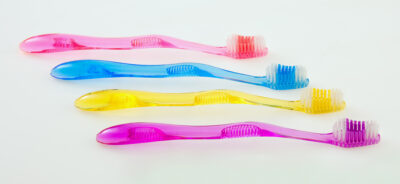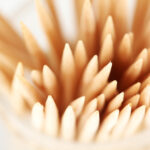The Simple Answer is Twice a Day
In some areas of our planet, simple tooth brushing and flossing is a luxury. The lack of clean water, the lack of toothbrushes, and no drug stores to purchase dental floss all combine to make basic oral hygiene a challenge. Despite this, many cultures still value dental care. Using fairly primitive instruments, such as the “toothbrush bush” and other means, some successfully manage to keep their teeth strong, relatively healthy and functional throughout their lives. Here in our society, where we generally appreciate the idea of healthy teeth, we have it easy. Clean water, toothbrushes for a dollar or less, enough dental floss to go around the world – our biggest challenge is not the tools, it is the time. We have to make the time to take care of our teeth. But does it really take that much time to brush, floss and care for our teeth? Let’s look at the numbers.
Toothbrushing Technique
Battling plaque and oral bacteria at home is an ongoing process and requires daily brushing. Your teeth need at least two blocks of brushing time, each morning and each night before bed. How long are those blocks of time? Two minutes. That’s all — two minutes. Added together, a minimum of four minutes a day brushing your teeth is essential. Is brushing for less time bad for you? Most likely it is. Is brushing longer or more often bad for you? Not if you brush properly, especially if your extra brushing sessions are after meals. The technique is simple, but important.
- Brush gently using small, circular motions where your teeth meet your gums.
- Brush every surface of each tooth, front and back.
- Brush your tongue – this removes additional bacteria and improves your breath.
- Use a soft bristled toothbrush and toothpaste approved by the American Dental Association.
- Replace your toothbrush when the bristles are bent or worn.
Electric toothbrushes are recommended, since they remove plaque more efficiently when used according to specifications.
Flossing Technique
Flossing daily is the best method for cleaning between your teeth and under your gums. It removes food particles trapped between your teeth and cleans out plaque colonies. Flossing saves your teeth, gums and bone from a host of dental headaches, and makes regular dental cleanings easier. It also helps keep your breath fresh and ready for close encounters with friends, loved ones and co-workers. Try out a variety of flosses and find one you like. Some people prefer waxed, others like woven, dental tape or ribbon floss. For flavors there are mint, cinnamon and plain. There are also interdental brushes and water flossers. The important thing is to use a flossing method every day! So get one, or a variety, that you’ll use regularly. You can floss before you brush to clean the teeth and prep them for fluoride (which is now preferred), or floss traditionally after you brush. Here is the technique for using ordinary dental floss.
- Use your thumbs and forefingers to guide the dental floss, gently inserting it between your teeth with a sawing motion.
- Use a new section of floss for each area, so you don’t pass bacteria around your mouth from place to place.
- Curve the floss around each tooth and under the gum line. Gently move the floss up and down, cleaning the sides of each tooth.
- Don’t forget your back molars, glide the floss against the back of them to remove plaque.
Floss holders are recommended only if it’s difficult to use conventional floss.
Rinsing to Finish
Rinse your mouth with water after brushing to further disrupt bacteria and remove food particles from your mouth. Water is one of your teeth’s best allies in the battle against bacteria. If you are not able to brush after each meal, swish with water. Avoid sugary and acidic drinks, and use water throughout the day to keep your mouth hydrated and healthy. Dental rinse aids are also beneficial, if used correctly. Never use a mouthwash to mask bad breath. Bad breath should only occur after a period of not brushing or after a particularly pungent meal. Persistently bad breath should not be fought with rinses, mints or gum. See your Placerville dentists if you have this problem, as ongoing halitosis requires a solution involving dental treatment or certain prescription medicines.
This is a solid home program for healthy teeth and gums. Brush properly for two minutes in the morning. Brush properly for two minutes before going to bed. Floss properly once a day. Rinse after brushing, flossing and eating. Six minutes a day leads to good dental health. You have six minutes, don’t you?


